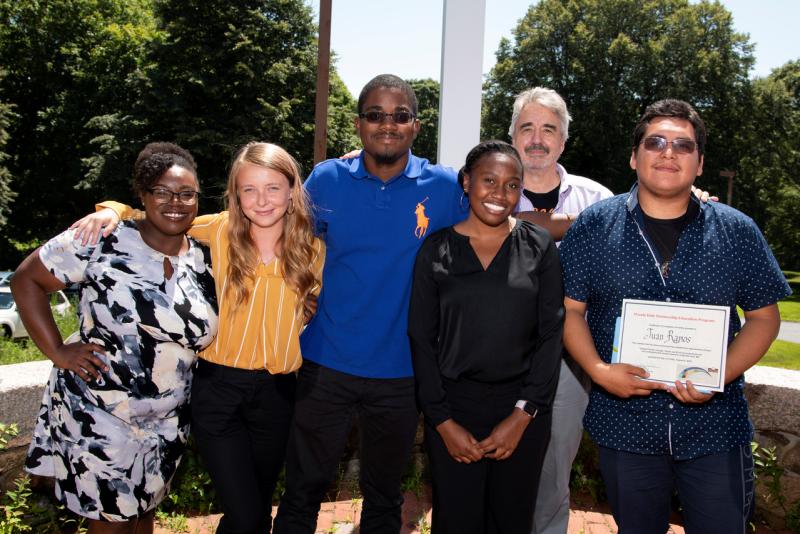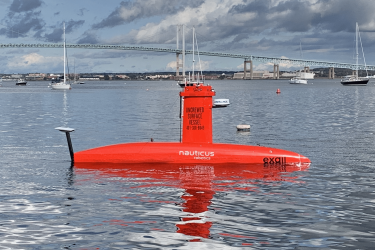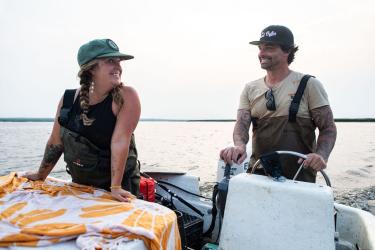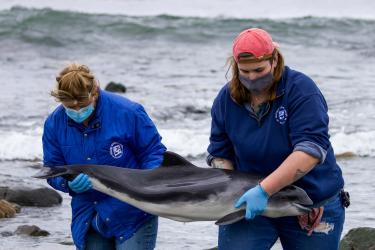We continue our series to introduce the people who work at the Northeast Fisheries Science Center. Each month we feature a new "face" from the Center's five laboratories. We share with you a bit about who they are, what they do at the Center, and what they enjoy doing in their spare time. This month we are talking to Kwanza Johnson, Academic Programs Coordinator at the center.
Where did you grow up?
I grew up in a small neighborhood in Collinwood Village in Cleveland, Ohio. The highlights of my childhood were family vacations, trips to the swimming pool, softball all summer (yay!), spending time with my siblings, and Girl Scouts. Living 10-minutes from Lake Erie was also a huge plus!
Where did you go to school and what did you get your degree(s) in?
My college career began while I was still in high school. Around 10th grade, several friends and I scored high enough on the PSAT that we became eligible for an early college entry program. I began taking introductory level course work and earned credits that I later transferred toward my undergraduate degree.
I am an alumna of Bethune-Cookman University in Daytona Beach, Florida. The college was founded in 1904 by Dr. Mary McLeod Bethune. It’s a privately owned, historically black college/university (HBCU) and is a new member of the NOAA Center for Coastal and Marine Ecosystems. While there, I completed the Integrated Environmental Science (IES) Bachelor of Science program, which introduced me to geographic information systems and remote sensing. My senior thesis included working with hyperspectral imagery to develop an algorithm for early algal bloom detection methods for the Indian River Lagoon. The lagoon is a beloved local estuary affected by a brown bloom algal event. This has led to fish kills, anoxic and hypoxic zones, and ultimately the death of manatees, seabirds, dolphins, and many other vulnerable organisms.
I am currently working toward my master’s degree in geographic information science online through Kent State University in Kent, Ohio.
How did you come to work at the Northeast Fisheries Science Center?
In the summer of 2016, I was a student in the Woods Hole Partnership Education Program (PEP). My project investigated the effects of red tide on tourism to Cape Cod at the Woods Hole Oceanographic Institution’s Marine Policy Center with staff member Porter Hoagland. Days after departing from the program, I began teaching sixth grade science for Broward County Public Schools in Ft. Lauderdale, Florida. About a year later, I was accepted into the Pathways Program and interned in the Education Office at the Louis Stokes VA Medical Center in Cleveland, Ohio. I was still in contact with my mentors from PEP, as they would often (and still do) share opportunities with alumni. I applied for this position, was hired, and began working in January of 2018.
What do you do at the Science Center?
I am the Academic Programs Coordinator. My priorities are to help organize, plan, manage and develop center-wide student programs. I work with students at the Center who have been involved with NOAA’s Ernest F. Hollings undergraduate scholarships, Educational Partnership Program undergraduate scholarships, and Experiential Research & Training Opportunities. Locally, I have also worked with NOAA Fisheries students involved with NOAA’s Cooperative Institute for the North Atlantic Region, hosted at Woods Hole Oceanographic Institution, and with summer interns at the center's Woods Hole Science Aquarium and with PEP.
I also provide avenues for students to network and further their knowledge of opportunities, and assist with on-boarding and welcoming new students to the center. I help build connections across internship programs.
Most of the year, and especially during the summer, my time is spent preparing for the arrival of the PEP students and assisting with program logistics. I also travel on PEP recruitment trips to campuses of HBCUs or minority serving institutions. I go to scientific conferences to meet and encourage students to apply to the program.
A major focus of my work is diversity and inclusion. This is through NOAA-centered events or committees and local efforts with partner institutions, such as the Woods Hole Diversity Advisory Committee. I contribute ideas, time, and effort toward making representation of people from a multitude of backgrounds a priority.
What do you like most about your position?
Working with interns is very nostalgic for me because it’s such a recent experience. I can really relate to them and help them in their budding careers. The potential our students possess is mind blowing, and makes me hopeful for the future. Supporting students is the most rewarding part of what I can do to help our center continue to grow.
What are some of your hobbies?
Playing softball, traveling, and spending time with family and friends are a favorite way to spend my time outside of work. I have three young nephews and they keep me on my toes! I also enjoy listening to music, do-it-yourself projects, and reading classic literature and novels from African-American/Black authors.
For more information, please contact Shelley Dawicki.






